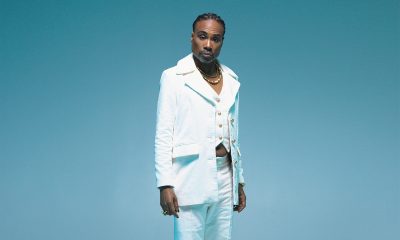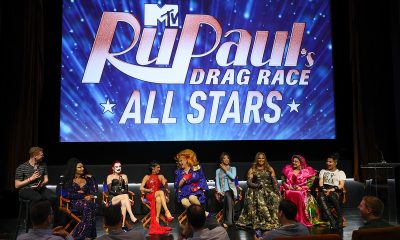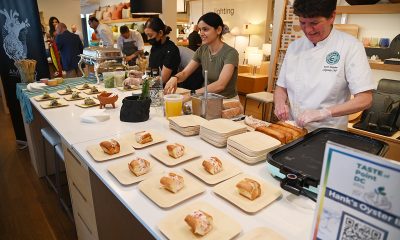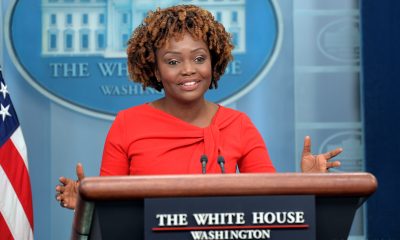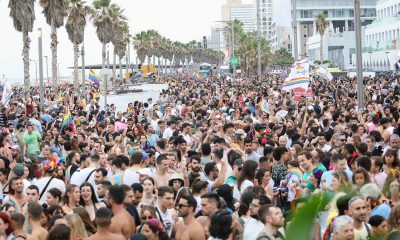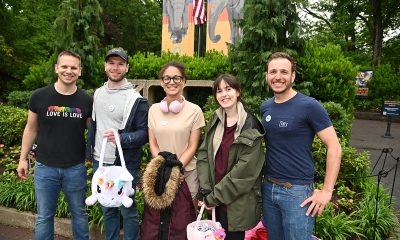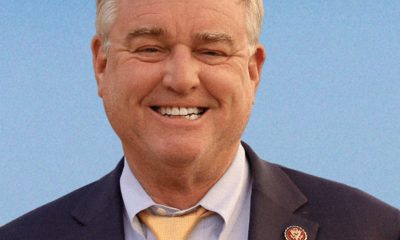a&e features
Diane Rehm successor is not who you’d expect
Out ‘1A’ host Joshua Johnson is passionate journalist first and foremost
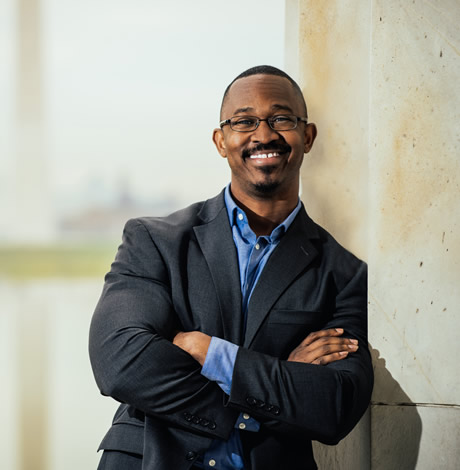
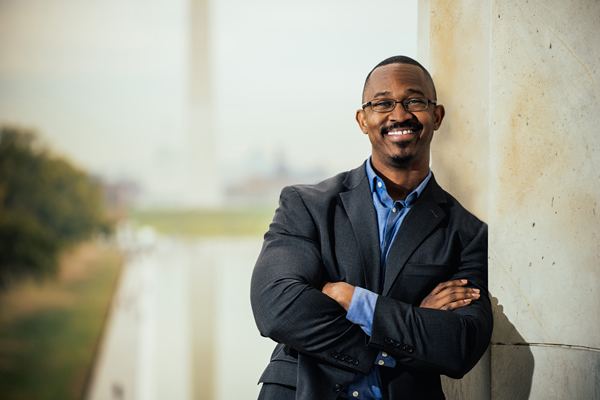
Joshua Johnson says launching a new daily two-hour radio show is a ‘mountain of work even under the best of circumstances.’ (Photo courtesy WAMU)
It was last Halloween weekend when Joshua Johnson got the call that he’d been named Diane Rehm’s successor.
Rehm, who began her eponymous National Public Radio call-in show in 1979, retired in December and as of Jan. 2, WAMU broadcasts a new show, “1A” in what had been “The Diane Rehm Show’s” timeslot.
Johnson had subbed for Rehm two days last September and shadowed her another day. Based in San Francisco for the last six-and-a-half years where he was morning news host for KQED while also teaching podcasting at the University of California (Berkeley), Johnson was in Palm Springs visiting friends with Joe Gallagher, his boyfriend of a year and a half, when he got the call. He says it’s a moment he’d been working toward since age 6.
“This wave of peace washed over me and I just got very calm,” says the 36-year-old South Florida native. “It was like my fists finally unclenched after weeks of waiting. I didn’t have that moment of, ‘Oh my God, I’m going to do the show.’ It was just kind of like, ‘Finally — I’ve been waiting on this for my entire life and now it’s going to happen.”
“1A” is a live, two-hour daily WAMU radio program distributed nationally by NPR each weekday at 10 a.m. that seeks to “provide deep conversation about the thorniest issues of our time delivered with insight, intimacy and personality.” It’s both a new, freestanding show but also a successor to the Rehm show, whose “legacy of civil dialogue and analysis” its team hopes to continue.
Producers were initially almost certain they’d hire a woman to succeed Rehm.
“We weren’t 100 percent sure, but you know, sort of in the high 80s or 90s,” says Rupert Allman, “1A’s” executive producer. Johnson won the search team over, Allman says, with his “huge relatability.”
“There was something about his own curiosity and his manner that was really appealing,” he says. “Especially the idea that he was very much interested in civil dialogue, taking time to develop arguments and not always chasing the next shiny ball. Those pieces came together and the stars began to align and that was it.”
Nobody’s universally loved in this era of Internet trolling, but early signs are strong for Johnson. “1A” is being carried on 204 stations with more expected in April (“The Diane Rehm Show” was carried on 198) and WAMU says the show was the No. 1 regional performer in its time slot throughout January, the latest month for which figures were available. WAMU says it expects the show will have a weekly audience of about 2.5 million soon based on early numbers.
Johnson, as loquacious as you’d expect, sat with the Blade in a WAMU conference room on Feb. 16. His comments have been edited for length.
WASHINGTON BLADE: How do you feel it’s going so far?
JOSHUA JOHNSON: It’s going well. Very, very busy. There’s no lack of things to talk about for sure, but it’s good. Launching a national show, any new show, is a heavy lift to say the least, but we have an amazingly good team and we’ve had lots of support from listeners and stations. We’ve found interesting ways to talk about what’s going on in the world and to divert from the headlines that have everyone’s attention to talk about other topics that may be getting lost in the shuffle around the new administration. And we’ve also found ways to take a breath and just do topics that are fun or different as a little relief from the top of the news cycle, so I think it’s been good.
BLADE: What’s your strategy to turn this into more of a Johnny Carson-to-Jay Leno kind of succession as opposed to, say, a Pat Sajak kind-of thing?
JOHNSON: The only thing we can do is control each day’s program and that’s what I try to focus on. I never worry about the 37 years that came before me. That’s Diane’s legacy and that’s solid and done. …. If you worry too much about the distant future, you miss the opportunity to really knock out today.
BLADE: Has the learning curve been about what you thought it would be?
JOHNSON: I tried to come in with very few expectations other than it would be really, really hard and it has been. …. But we’ve gone down from me working like 16-17-hour days to more like 12-13, so that’s a big step forward. … It’s just a mountain of work even under the best of circumstances.
BLADE: What’s been your favorite episode so far?
JOHNSON: I don’t have one. We did a Sunday show a few weeks ago on the immigration ban and we just let stations air it if they wanted to. … But we probably haven’t done my favorite show yet or even conceived of it. I think for me to start grabbing onto favorites at this point would set the bar too low for what we want to be. I don’t think what we’ve done in our first month will compare to what we’ll be doing a year from now or five years from now.
BLADE: When things are crazy, do you get energized or stressed by that?
JOHNSON: Probably a little bit of both. I tend to be the kind of person that the crazier things are around me, the calmer I get, which is how I survived breaking news. … But you have to be on the outer edge of your comfort zone in order to grow, so I just accepted that that was going to be the way it was going to be some days or maybe even most days.
BLADE: Was it hard to leave San Francisco?
JOHNSON: It was really, really hard … but this opportunity was worth it.
BLADE: Have you had any time to explore Washington much yet?
JOHNSON: No. I live a few blocks from the station here in Van Ness, so I walk to work because I cannot take a snow day. And everything I need is right here, the grocery store, the gym and so on. Once I get a better handle on the workload, I’ll be able to get out more and see the city.
BLADE: Were you intimidated to accept?
JOHNSON: Not really. …. I think I was more grateful and humble. … I felt very ready. Like, “Yeah — I’ve been preparing for this for 30-plus years.”
BLADE: You say you had this dream since age 5 or 6. How was this type of thing even on your radar at that age?
JOHNSON: Well, Kermit the Frog played a reporter on “Sesame Street.” …. I grew up seeing Ed Bradley on “60 Minutes” or Bernard Shaw on CNN or Dwight Lauderdale on my local Miami ABC station. Seeing those black men doing what I wanted to do just instantly clicked for me. I always had an affinity for broadcasting. I just didn’t know what form it would take.
BLADE: So was it something you chose or did it choose you?
JOHNSON: Well, it has to be both. Just because destiny knocks doesn’t mean you have to answer. It went through a lot of permutations of whether I would answer or how I would answer and then eventually it became that one thing that I knew if I didn’t go after, I’d regret the rest of my life.
BLADE: Had you been a big listener of “The Diane Rehm Show”?
JOHNSON: Yeah, I listened to her in South Florida on the station where I grew up, WLRN. I never thought I’d be her successor, but yeah, I listened to her for years.
BLADE: How do you decide on the balance between meat-and-potatoes news topics and lighter stuff?
JOHNSON: I don’t think it’s a matter of balancing lightness against substance. The show we did on country music was very substantive. What we’re always trying to figure out is what is it about today’s show that a fan would tell their friends, “You gotta listen to today’s ‘1A.’” Why? How do you answer that? if you start there and work backwards, you can build a great show. So even if it’s a lighter topic like country music today or the Grammy Awards or the Super Bowl, we never want it to feel like, “OK everybody, we know life is really hard so we’re just gonna give you some sugar and candy for an hour.” That’s not good enough. Even if it’s not politics or not some trouble-in-the-world topic, it still has to be time well spent. Plus, I get bored easily, so I get tired of talking about the troubles of the world all day. …. It can’t be all sugar but it can’t be all steak.
BLADE: Some people are saying there’s been more sugar though lately. The Super Bowl show got some flak.
JOHNSON: It depends whose table you’re dining at. I think there are different ways to talk about different things. I did have a listener who got very snooty about the Super Bowl show …. but there are many aspects to a cultural event like that that are worthy of discussion. … Just because people listen to NPR doesn’t mean they don’t watch football and just because they listen to NPR doesn’t mean they don’t like pop music.
BLADE: True, but hasn’t NPR always sort of been that hub where you could get something you couldn’t just get anywhere else? If ESPN is doing round-the-clock sports coverage, do we really need to hear about sports on NPR too?
JOHNSON: But we don’t talk about the Super Bowl like ESPN would talk about it. We didn’t get caught up in stats and who’s up and who’s down. We talked about it more broadly, about what was going on in Houston and sort of the politics around the event, the cost of buying an ad there and so on. We tried to make it really fun. One thing public media serves is to give people a diverse view on the world. Anybody who thinks public media is designed to be all meat and potatoes all the time has clearly never heard “Car Talk” or “Wait Wait … Don’t Tell Me.” … These are just wonderful shows that are about interesting things that make life worthwhile and we can’t pretend that doesn’t matter.
BLADE: Does the “1A” format give you more opportunity to weigh in than other journalism posts you’ve had?
JOHNSON: No. My job is still to be an analyst of the day’s events. This is not the Joshua Johnson show. It’s not my platform to tell you what I think about the news. I’m still a reporter. But that doesn’t mean I can’t call out inconsistencies. The other day we had a guest who kind of fudged an answer on climate change and I (called him out). But I can do it in a way that hews to evidence and fact and not just my belief.
BLADE: There’s so much obfuscation in partisan discussions, though. How do you press people for clarity without sounding partisan, at least at times?
JOHNSON: The way we’ve been doing it —what we do works. You do your homework, you do smart shows, you ask smart questions and you don’t worry about whether people like you or are comfortable with it. I’m here to perform a service as a journalist. … For me to start worrying about it now is to doubt the very reasons I came here. Facts still matter, the truth is still the truth and there are still such things as facts. People know and understand what the NPR standard is and outlets that don’t follow that standard — I don’t need to worry about people who deal in that kind of foolishness.
BLADE: How do you decide if you’re going to pick up a thread after a break or not?
JOHNSON: It depends what’s coming up after the break. If we have a guest we need to get to or we have other questions that segue into that thought. Being in the studio is basically air traffic control because we have guests in the studio, remote guests, my script, my questions, I’m watching the clock, I have a timer that counts down to certain elements, then I have another screen that shows me e-mails and Tweets and Facebook posts and if we receive a voicemail during the show, we can play that. I have my laptop, which has more communication, I’m in touch with the control room and the newsroom upstairs and it’s all happening at once. There are all these different elements that I have to make balance so it’s a lot of plate spinning. It will be different every single day and I have to figure out in the moment what we’re going to next and if it’s duplicative of what we just said, how much time we have left and so on.
BLADE: How many people work on the show and are any of them veterans of Diane’s show?
JOHNSON: I think we have 11. Two of them were former producers on her team. The rest are new hires.
BLADE: Do you anticipate getting more mileage out of the Trump administration than you otherwise would have?
JOHNSON: There’s more to life in Washington so I don’t look to any one sector of the news as my bread and butter. … Also, public radio is very committed to the idea of localism … so we can’t allow the current political climate to eclipse all of that because then you’re basically saying that localism doesn’t matter anymore … so we keep that all in perspective.
BLADE: Even though “1A” is distributed throughout the country, doesn’t it seem slightly odd considering WAMU’s push for live and local to have brought you in from San Francisco? Some listeners were predicting a Washington person. Do you know how many names were in the hat?
JOHNSON: I don’t. I’ve heard different numbers but I honestly don’t know nor do I know who they were. As for live and local, we are live and we are a program from WAMU. I think it’s important to the DNA of public radio that local stations are a provider of national programming (gives examples). We are Washington’s NPR station and we think the ability of WAMU to produce shows like “1A” and “Big Listen” is something we can be proud of. (Allman says Johnson’s outsider status was a plus. “[We liked that] he wasn’t from D.C., is not wowed by the Beltway. He brings a completely different perspective on the country. He gives the audience something new, someone they didn’t know so it doesn’t just seem like the business of shuffling people around.”)
BLADE: You seem at times a bit more abrupt than Diane. Do you agree?
JOHNSON: I try not to be. If I interrupt, I try to apologize for it unless they’re just going off the deep end. I try to be as respectful as I can but that doesn’t mean we have time to let everybody finish their thought.
BLADE: How serious are you and your boyfriend? Any plans for him to move out here eventually as well?
JOHNSON: He owns a barbershop in San Francisco so there are some moving parts we’d have to figure out. For now, we’re doing the bicoastal thing. We’ll make it work.
BLADE: Is Millennial engagement a big push at NPR? Are NPR stations seeing the drop-off we hear about at the orchestra, the ballet, the mainline churches and so on?
JOHNSON: Millennials have gotten a bad rap. They consume immense amounts of news and information — they just do it differently. There are a lot of NPR member stations that are trying to be where younger audiences are. … We’re also getting better at saying, “Hey, maybe we don’t have a relationship now, but check this out.” Or, “We’ll try to make ourselves available in a bunch of different ways and if you only listen once or twice, that’s cool.” Or, “If you’re a fan of this podcast or station but don’t yet understand why you should give, fine.” … We’re getting better at accepting people where they are in the continuum of use in public radio. …. I think the institutions that do well are going to be the ones that skate harder in the direction the puck is going, not just going in the direction they wish it would go.
BLADE: You told Diane Rehm you hoped race would inform the program but not be the lens of the program. What’s the difference?
JOHNSON: Well, it’s about taking the experiences of your life and using them to add context to a conversation. You know, my lens on life is that I’m an African-American man in the 20th and 21st century. I can’t pretend that’s not who I am. So for me to pretend that it’s not or to pretend that I view life with no conception of race, that would be a lie. I have to acknowledge my life experiences. But at the same time as a journalist, I can step out of those experiences and try to view something from another person’s perspective. I can’t step outside of what I won’t acknowledge. It’s like taking off a shirt you don’t admit you put on. I have to own the truth of my life … but I don’t want people to feel like it’s a black man’s perspective on the news or that I’m a black man doing the news. Because I own the totality of who I am, I can step out of it as a journalist and say, “OK, let me see how people with different life experiences than me view this.”
BLADE: Did either being gay or being black pose any career hindrances?
JOHNSON: I don’t think either one was detrimental. I grew up in South Florida, which is a very gay-friendly news market. … I made a decision early on that I couldn’t make a career out of telling the truth about everyone else’s life while lying about my own. I knew eventually one of those lies would come back to bite me because one of them would be leverage for someone to use over me, so I decided I just needed to own the whole truth of my life and not let that be an impediment to my success. … Once you as a gay man deal with shame and you learn how poisonous it is, it can give you the leverage to never impute that shame on other people because it never helps, it never lifts up, it never clarifies, it never improves anything. … It burns everything it touches, so I just decided not to play with that fire because I knew what that burn feels like.
BLADE: That’s profound — what age were you? I wouldn’t have been able to articulate any of that at 16, 17, 18.
JOHNSON: I wouldn’t have been able to say that to you at that age either but I tend to be a very logical person but growing up in the Baptist church … I just thought to myself, the scriptures say you will know the truth and the truth will set you free. Well, this is the truth of my life. There has to be some freedom in here somewhere and I just held on to that. This is what the book says. This has to make sense somehow. That thought process always served me well as a journalist so how do these two things lock together? I just allowed that process to play out.
BLADE: But you make it sound so tidy. Surely there was some angst at some point, no?
JOHNSON: Oh, of course there was. This was just the ending. But yeah, there were times it was awful, it was terrible. Coming out sucks even under the best of circumstances. But working through that gave me a way to figure out where my inner reservoir of toughness came from in terms of career. I knew I had this dream and I was too greedy to give up on it.
a&e features
‘RuPaul’s Drag Race: All Stars’ cast visits D.C.
8 queens vie for $200,000 prize for charity in new season, premiering May 17
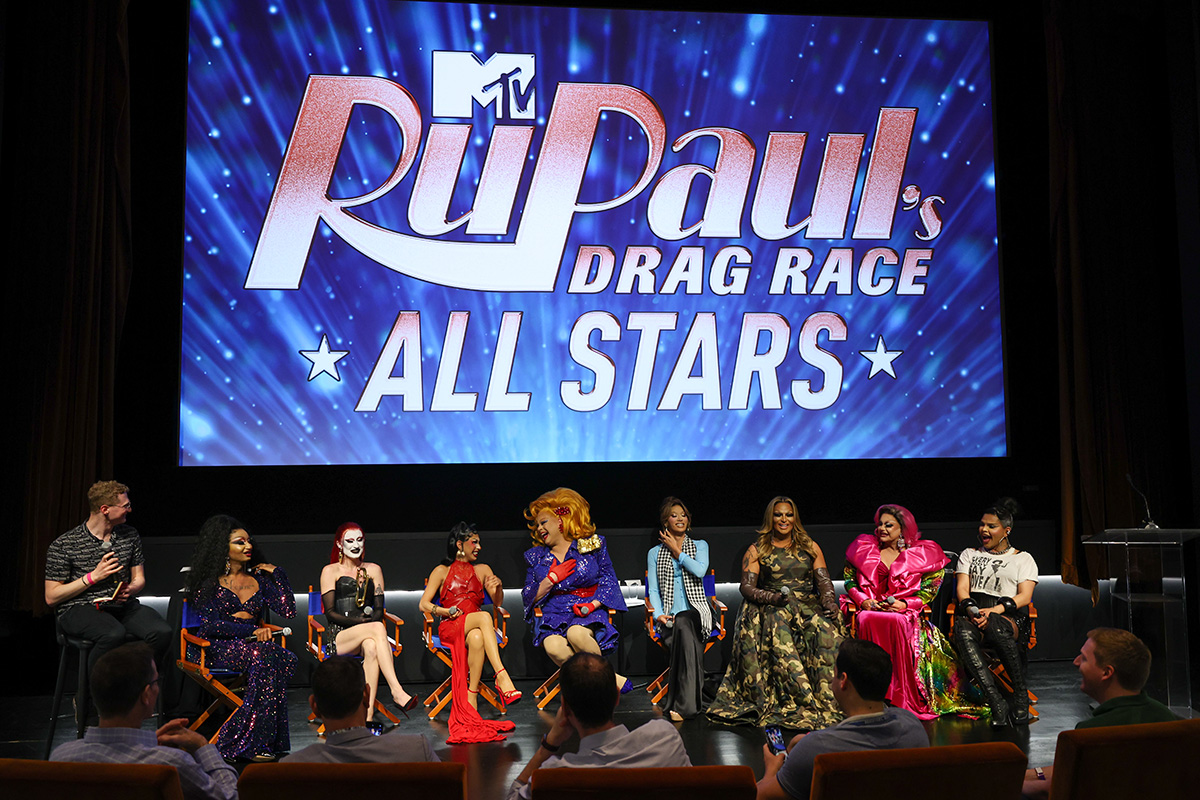
Donning sparkling and star-studded red, white, and blue attire on a gloomy, humid D.C. Monday, the cast of the latest “RuPaul’s Drag Race All Stars” season sashayed on the National Mall to promote the reality show’s ninth season.
This upcoming season is different than those in the past — eight queens are competing for a donation of $200,000 for the charity of their choosing, rather than a personal cash prize.
Several cast members noted how it felt important to visit the nation’s capital, being authentically themselves and wearing drag. Nina West, who competed in season 11, likened drag to armor.
“We’re here during a really specific time in history, that’s, I would say, markedly dark,” she told the Blade at the steps of the Lincoln Memorial. “And there’s an opportunity, as drag has always done, which is for our community as specifically LGBTQI+ people, to stand in our truth and be wonderful — like guardians and fighters for our community.”
She’s competing for the Trevor Project, which is focused on suicide prevention and crisis intervention for young LGBTQ people. This season’s pivot to compete for charity made Nina West want to come back on the show for the All Stars season. She’s been offered the spot two times before this, she said, and this twist aligned with what she wanted to do.
Several of the other queens mentioned that it’s an honor to be featured in this season, including season 5’s Roxxxy Andrews. She also competed in two subsequent All-Stars seasons.
She chose the organization Miracle of Love, which provides HIV/AIDS prevention programming and assistance in central Florida. It’s a smaller, more local organization, which is why Roxxxy Andrews chose it. She wants to make its work more nationally known. Also, vying to win during a charity season makes the competition feel more rewarding, she said.
Plastique Tiara of season 11 also noted it’s different competing for charity. She’s competing for the Asian American Foundation, which launched in 2021 in response to the rise in anti-Asian hate and aims to curb discrimination and violence through education and investments in nonprofits.
“It’s more competitive because then you’re fighting not just only for yourself, but your ideas and the things that you love,” she said.
Vanessa Vanjie of seasons 10 and 11 agreed that competing for charity adds a bit more pressure — she chose the ASPCA. And as onlookers near the Lincoln Memorial took pictures of and with the queens, she said she was relieved.
“I was a little bit worried somebody would yell some slurs at us,” Vanessa Vanjie said. “Nothing happened. Everybody came to take pictures like Santa Claus in the middle of the mall.”
There’s a range of contestants from different seasons for this round of All Stars. Some queens hail from recent seasons, but Shannel competed on the show’s first season. To be a part of this new season is surreal, she said.
She’s competing for the Anxiety and Depression Association of America, which she has a close tie to. She’s dealt with anxiety her entire life. The association is focused on increasing awareness and improving diagnosis and treatment.
“I always felt like I just wasn’t normal, sadly,” she said. “And so now being able to be able to do this season and to get back to that organization is like amazing to me.”
Gottmik, from season 13, is competing for Trans Lifeline — a nonprofit providing advocacy, a hotline and grants created by trans people, for trans people. Being able to do drag and give back is the “perfect scenario,” Gottmik said.
Gottmik was the first openly trans man on Drag Race, which was overwhelming when first on the show. Gottmik felt pressure to be the “perfect example,” but later realized that they didn’t have to worry so much.
“I just want to show people that trans people are real people. We can express ourselves however we want to express ourselves, through drag, through whatever it may be,” Gottmik said.
The new season will be available to stream on Paramount+ on May 17.
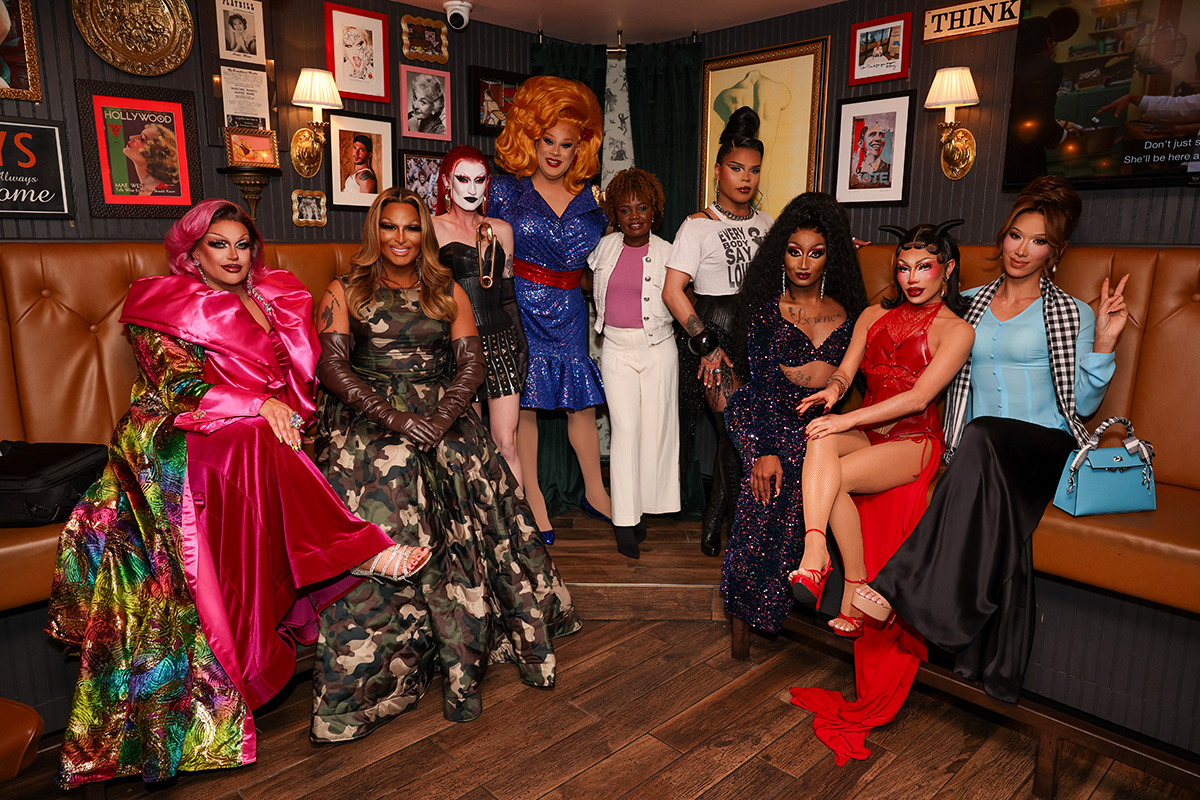
a&e features
Pride season has begun
LGBTQ parades, festivals to be held throughout region in coming months
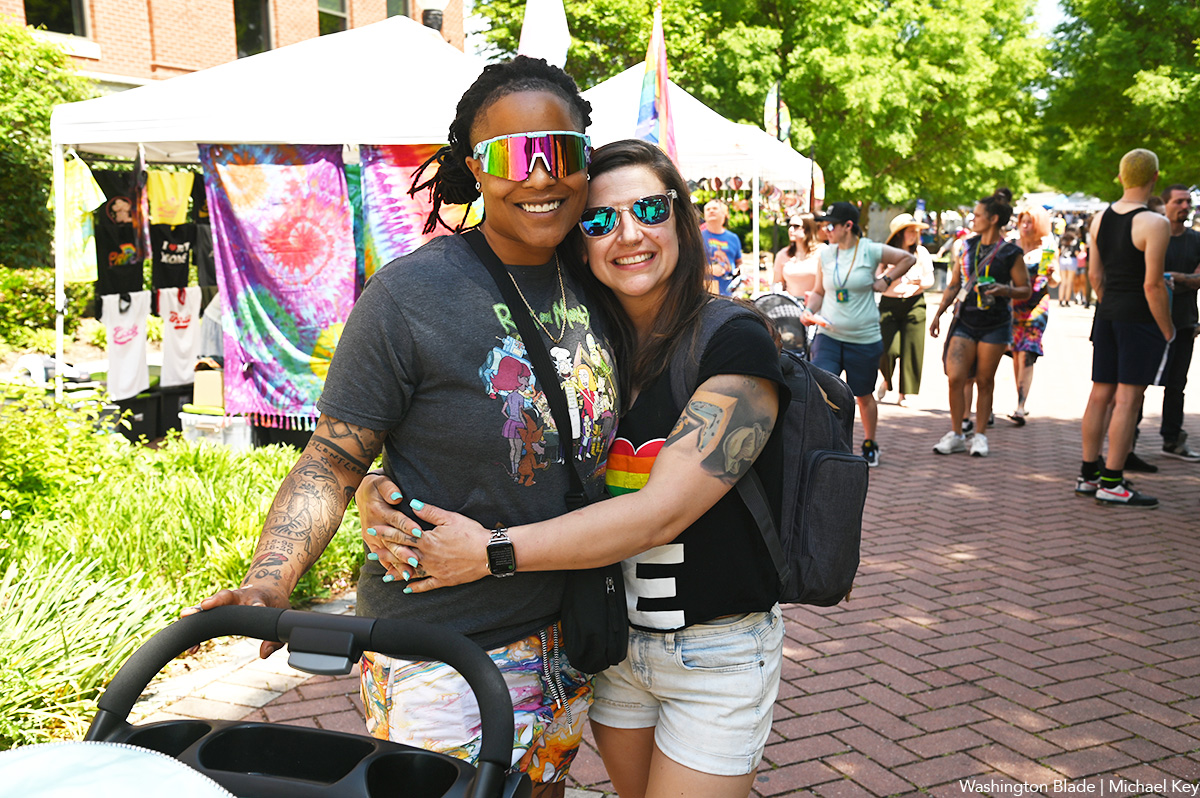
LGBTQ Pride festivals, parades and other events have been scheduled in large cities and small towns throughout the region. Pride events around the world culminate in June, but organizers in some municipalities have elected to hold celebrations in other months.
Pride in the region has already begun with last weekend’s Mr., Miss, and Mx. Capital Pride Pageant held at Penn Social as well as Roanoke Pride Festival held in Elmwood Park in Roanoke, Va.
Below is a list of Pride events coming to the region.
MAY
Capital Trans Pride is scheduled for 9:30 a.m.-5 p.m. on Saturday, May 18 at the Martin Luther King, Jr. Memorial Library (901 G St., N.W.). The website for the event advertises workshops, panel discussions, a keynote address, a resource fair and more. transpridewashingtondc.org
Equality Prince William Pride is scheduled for 12-4 p.m. on May 18 at the Harris Pavilion (9201 Center St.) in historic downtown Manassas, Va. equalityprincewilliam.org
D.C. Black Pride holds events throughout the city May 24-27. Highlights include an opening reception, dance parties and a community festival at Fort Dupont Park. The Westin Washington, DC Downtown (999 9th St., N.W.) is the host hotel, with several events scheduled there. dcblackpride.org
NOVA Pride and Safe Space NOVA will hold NOVA Pride Prom from 7-11 p.m. on May 31 at Torpedo Factory Art Center in Alexandria, Va. The event is open to all high school students throughout the region, regardless of identity, from rising ninth grade students to graduating seniors. novapride.org
Capital Pride Honors will be held on May 31. The Capital Pride Alliance has announced on its website that nominations are open for awardees. The Honors celebrates excellence in the LGBTQ community and its allies. capitalpride.org
JUNE
Downtown Sykesville Connection is sponsoring Sykesville Pride Day in downtown Sykesville, Md. on June 1 from 12-4 p.m. downtownsykesville.com
Reston Pride will be held at Lake Anne Plaza in Reston, Va. on June 1 from 12-6 p.m. restonpride.org
Fairfax Pride, hosted by the City of Fairfax and George Mason University, will be held at Old Town Hall (3999 University Drive, Fairfax, Va.) on June 1 from 5-7 p.m. The event will include children’s activities and more. fairfaxva.gov
OEC Pride celebrates Pride with “art, dance, education, and fun” in Old Ellicott City. The OEC Pride Festival is held along Main Street in Ellicott City, Md. on June 1 from 10 a.m.-10 p.m. visitoldellicottcity.com
Annapolis Pride has consistently drawn a giant crowd for a parade and festival in the quaint downtown of the Maryland capital. “The Voice” star L. Rodgers has been announced to headline the 2024 festival. The parade and festival will be held on June 1. annapolispride.org
The Alexandria LGBTQ+ Task Force Alexandria Pride is scheduled to be held at Alexandria City Hall from 3 – 6 p.m. on June 1 in Alexandria, Va. alexandriava.gov
The Portsmouth Pride Fest will be held at Festival Park adjacent to the Atlantic-Union Bank Pavilion in Portsmouth, Va. on June 1 from 11 a.m.-5 p.m. portsmouthprideva.com
The Delaware Pride Festival is a free event scheduled for June 1 at Legislative Hall in Dover, Del. from 10 a.m.-5 p.m.The event is billed as family friendly and open to people of all ages and sexual orientations. delawarepride.org
The City of Rockville is hosting Rockville Pride at Rockville Town Square (131 Gibbs St., Rockville, Md.) from 2-5 p.m. on June 2. The free event features live performances, information booths, and children’s activities. rockvillemd.gov
Equality Loudoun is hosting the ticketed Loudoun Pride Festival from 1-7 p.m. on June 2 at Claude Moore Park in Sterling, Va. The event features three stages, a “#Dragstravaganza,” a kid’s zone, an alcohol pavilion, a food hall and more. Tickets $5. eqloco.com
Culpepper Pride is slated to be held at Mountain Run Winery in Culpepper, Va. from 12-6 p.m. on June 2. The theme this year is “True Colors.” culpeperpride.org
The Southwest Virginia Pride Cookout Community Social is planned for 2 p.m. at the Charles R. Hill Senior Center in Vinton, Va. on June 2. For more information, visit the Facebook event page.
Capital Pride kicks off with the RIOT! Opening Party at Echostage starting at 9 p.m. on June 7. Tickets run from $27-$50 and can be purchased on the Capital Pride website. The event is set to feature Sapphire Cristál. capitalpride.org
Pride events continue over the weekend of June 8-9 in the nation’s capital with the Capital Pride Block Party featuring performers and a beverage garden, the massive Capital Pride Parade, Flashback: A totally Radical Tea Dance to be held at the end of the parade route, and the Capital Pride Festival and Concert. Visit capitalpride.org for more information. Other Pride events planned for the weekend in D.C. include a number of parties and the unforgettable (and free) Pride on the Pier & Fireworks Show at the Wharf sponsored by the Washington Blade from 2-10 p.m. prideonthepierdc.com
Pride in the ‘Peake will be held at Summit Pointe (580 Belaire Ave.) in Chesapeake, Va. on June 9 from 12-5 p.m. The family-focused Pride event does not serve alcohol, but will feature community organizations, food trucks and more in a street festival. For more information, visit the Facebook event page.
Celebrate with a drag show, dancing and a lot of wine at Two Twisted Posts Winery in Purcellville, Va. for a Pride Party from 2-5 p.m. on June 15. twotwistedposts.com
Baltimore Pride holds one of the largest Pride parades in the region on June 15 in Baltimore. (2418 Saint Paul St.). The parade concludes with a block party and festival. Pride events are scheduled from June 14-16. baltimorepride.org
The fourth annual Catonsville Pride Fest will be held at the Catonsville Presbyterian Church (1400 Frederick Rd.) in Catonsville, Md. on June 15 from 3-6 p.m. The event features a High Heel Race, pony rides, face painting, local cuisine and more. For more information, visit the Facebook event page.
The Ghent Business District Palace Shops have announced a Ghent Pride event from 5:30-9:30 p.m. on June 17 at the Palace Shops and Station (301 W 21st Street) in Norfolk, Va. ghentnorfolk.org
An event dedicated to celebrating the elders in the LGBTQ community, Silver Pride is scheduled for June 20 at 5:30-8:30 p.m. Location and more information to be announced soon. capitalpride.org
Visit the Hampton Roads PrideFest and Boat Parade for a truly unique Pride experience along the Elizabeth River. The full day of entertainment, education and celebration will be held on June 22 from 12-7 p.m. at Town Point Park (113 Waterside Dr.) in Norfolk, Va. hamptonroadspride.org
Frederick, Md. will hold its annual Frederick Pride Festival at Carroll Creek Linear Park on June 22 from 11 a.m.-6 p.m. Entertainers include CoCo Montrese of “RuPaul’s Drag Race.” frederickpride.org
The fourth annual Pride at the Beach is scheduled for 2-10 p.m. on June 23 at Neptune’s Park (3001 Atlantic Ave.) in Virginia Beach, Va. The event features entertainment, community vendors, beachside DJ sets, food trucks and offers a “perfect conclusion to an unforgettable Pride weekend.” hamptonroadspride.org
Winchester Pride will hold its Mx. Winchester Pride Pageant at 15 N. Loudoun St. in Winchester, Va. on June 23 at 6 p.m. Tickets are $20 in advance/$25 at the door. winchesterpride.com
The organizers of last year’s inaugural Ocean City Pride with a “parade” along the boardwalk in Ocean City, Md. have announced that they will be organizing a return this year with events from June 28-30. instagram.com
The third annual Arlington Pride Festival will be held at Long Bridge Park at National Landing (475 Long Bridge Dr.) in Arlington, Va. on June 29 from 11 a.m.-3 p.m. arlvapride.com
FXBG Pride is holding its annual community Fredericksburg Pride March on June 29 from 10-11 a.m. at Riverfront Park (705 Sophia St.) in Fredericksburg, Va. Speeches begin at 10 a.m. and the procession starts at 10:30 a.m. For more information, visit the Facebook event page.
Salisbury Pride “90’s Edition” is scheduled for 3 – 7 p.m. on June 29 in Downtown Salisbury, Md. Magnolia Applebottom is listed as the headliner and grand marshal. salisburyprideparade.com
The 2024 Suffolk Pride Festival is scheduled for Bennett’s Creek Park in Suffolk, Va. on June 30 from 12-7 p.m. Visit the Facebook event page for more information.
Expect music, entertainment and drag performances in the picturesque mountain town of Cumberland, Md. at the Cumberland Pride Festival on June 30 from 12-4 p.m. at Canal Place. cumberlandpride.org
Montgomery County’s annual Pride in the Plaza will be held on June 30 from 12-8 p.m. at Veterans Plaza (1 Veterans Place, Silver Spring, Md. liveinyourtruth.org
JULY
The sixth annual Westminster Pride Festival is scheduled for downtown Westminster, Md. on July 13 from 12-6 p.m. westminsterpride.org
Hagerstown Hopes is holding its annual Hagerstown Pride Festival in Doubs Woods Park (1307 Maryland Ave.) in Hagerstown, Md. on July 13 at 11 a.m. Visit the Facebook event page for more information.
The Rehoboth Beach Pride Festival will be held on July 20 from 10 a.m.-2 p.m., with other Sussex Pride events scheduled throughout the weekend of July 18-21. sussexpride.org
Us Giving Us Richmond hosts Black Pride RVA in Richmond, Va. with events on July 19-21. ugrcrva.org
a&e features
Eastern Shore chef named James Beard Finalist
Harley Peet creates inventive food in an inclusive space

In a small Eastern Shore town filled with boutiques, galleries, and the occasional cry of waterfowl from the Chesapeake, Chef Harley Peet is most at home. In his Viennese-inflected, Maryland-sourced fine-dining destination Bas Rouge, Peet draws from his Northern Michigan upbringing, Culinary Institute of America education, and identity as a gay man, for inspiration.
And recently, Peet was named a James Beard Finalist for Best Chef: Mid-Atlantic – the first “Best Chef: Mid-Atlantic” finalist representing the Eastern Shore.
Peet, after graduation from the Culinary Institute of America, took a position as sous chef at Tilghman Island Inn, not far from Bas Rouge. Falling in love with the Eastern Shore, he continued his passion for racing sailboats, boating, gardening, and fishing, and living his somewhat pastoral life as he opened Bas Rouge in 2016 as head chef, a restaurant part of the Bluepoint Hospitality group, which runs more than a dozen concepts in and around Easton, Md.
Coming from a rural area and being gay, Peet knew he had his work cut out for him. He was always aware that the service and hospitality industry “can be down and dirty and rough.”
Now as a leader in the kitchen, he aims to “set a good example, and treat people how I want to be treated. I also want to make sure if you’re at our establishment, I’m the first to stand up and say something.”
The Bas Rouge cuisine, he says, is Contemporary European. “I’m inspired by old-world techniques of countries like Austria, Germany, and France, but I love putting a new spin on classic dishes and finding innovative ways to incorporate the bounty of local Chesapeake ingredients.”
His proudest dish: the humble-yet-elevated Wiener Schnitzel. “It is authentic to what one would expect to find in Vienna, down to the Lingonberries.” From his in-house bakery, Peet dries and grinds the housemade Kaiser-Semmel bread to use as the breadcrumbs.
Peet works to support the LGBTQ community inside and outside of the kitchen. “I love that our Bluepoint Hospitality team has created welcoming spaces where our patrons feel comfortable dining at each of our establishments. Our staff have a genuine respect for one another and work together free of judgment.”
Representing Bluepoint, Peet has participated in events like Chefs for Equality with the Human Rights Campaign, advocating for LGBTQ rights.
At Bas Rouge, Peet brings together his passion for inclusion steeped in a sustainability ethic. He sees environmental stewardship as a way of life. Peet and his husband have lived and worked on their own organic farm for several years. Through research in Europe, he learned about international marine sourcing. Witnessing the impacts of overfishing, Peet considers his own role in promoting eco-friendly practices at Bas Rouge. To that end, he ensures responsible sourcing commitments through his purveyors, relationships that have helped create significant change in how people dine in Easton.
“I have built great relationships in the community and there’s nothing better than one of our long-standing purveyors stopping in with a cooler of fresh fish from the Chesapeake Bay. This goes especially for catching and plating the invasive blue catfish species, which helps control the species’ threat to the local ecosystem.
Through his kitchen exploits, Peet expressed a unique connection to another gay icon in a rural fine-dining restaurant: Patrick O’Connell, of three Michelin starred Inn at Little Washington. In fact, Peet’s husband helped design some of O’Connell’s kitchen spaces. They’ve both been able to navigate treacherous restaurant-industry waters, and have come out triumphant and celebrated. Of O’Connell, Peet says that he “sees [his restaurants] as canvas, all artistry, he sees this as every night is a show.” But at the same time, his “judgment-free space makes him a role model.”
Being in Easton itself is not without challenges. Sourcing is a challenge, having to either fly or ship in ingredients, whereas urban restaurants have the benefit of trucking, he says. The small town “is romantic and charming,” but logistics are difficult – one of the reasons that Peet ensures his team is diverse, building in different viewpoints, and also “making things a hell of a lot more fun.”
Reflecting on challenges and finding (and creating) space on the Eastern Shore, Peet confirmed how important it was to surround himself with people who set a good example, and “if you don’t like the way something is going … move on.”

